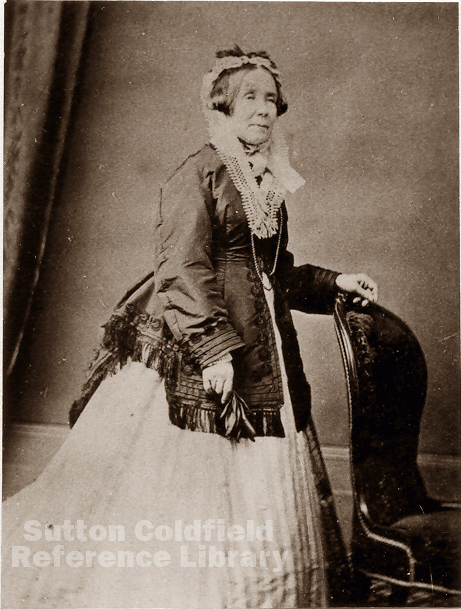When Miss Bracken came to live in Sutton with her widowed mother and two sisters, Sutton was still very much an agricultural town with a very rural aspect. This was about 1820, and being well-off they were able to move into Vesey House, no. 5, High Street, where Miss Bracken continued to live until her death in 1877. She led an active life, visiting London in 1827, and was keen to make herself useful in Sutton where her talents could be applied. This led her to spend time in the schools helping to teach drawing and music for which she had a gift.
A series of views of Sutton which Miss Bracken made in the 1850s show the town as an idyllic country place, and when she came to write her History of the Forest and Chase of Sutton Coldfield in 1860, this was the aspect she stressed, and which inspired her to florid language : “Munificent privileges are her [Sutton’s] domicile, primeval nature is her decoration…here the cottager, rambling in search of his depastured cattle, feels the pleasure of possessing rights, not the less acceptable that he shares them with his richest and his poorest neighbour”.
While seeing Sutton through rose-tinted spectacles she herself cut a rather formidable figure. Women could not hold political office, but she was an active member of the Ladies Committee, an unofficial body wielding great influence over the official corporation of the town, the Warden and Society. This committee concerned itself particularly with the schools and the welfare of the poor, and when it requested the Warden to tackle an issue, it was usually done.
As a boy, Richard Holbeche had declined taking drawing lessons from her, but he remembered her fondly -“the like of whom I do not know nor have ever known. A woman first, authoress, artist, antiquarian, philanthropist, of the strongest individuality, with the softest heart, such was Agnes Bracken, and I speak of her with respect and affection, Her delightful book on the place she loved so well is a local classic, her pictures adorn many of the drawing-room walls of what few old Suttonians remain, …She was thorough in her mission work, her activity in everything that was likely to benefit others or animals is not likely to be forgotten till the old Sutton folk have all died out, which perchance will be ere long”.

* - unindexed biography box 6 vi 08